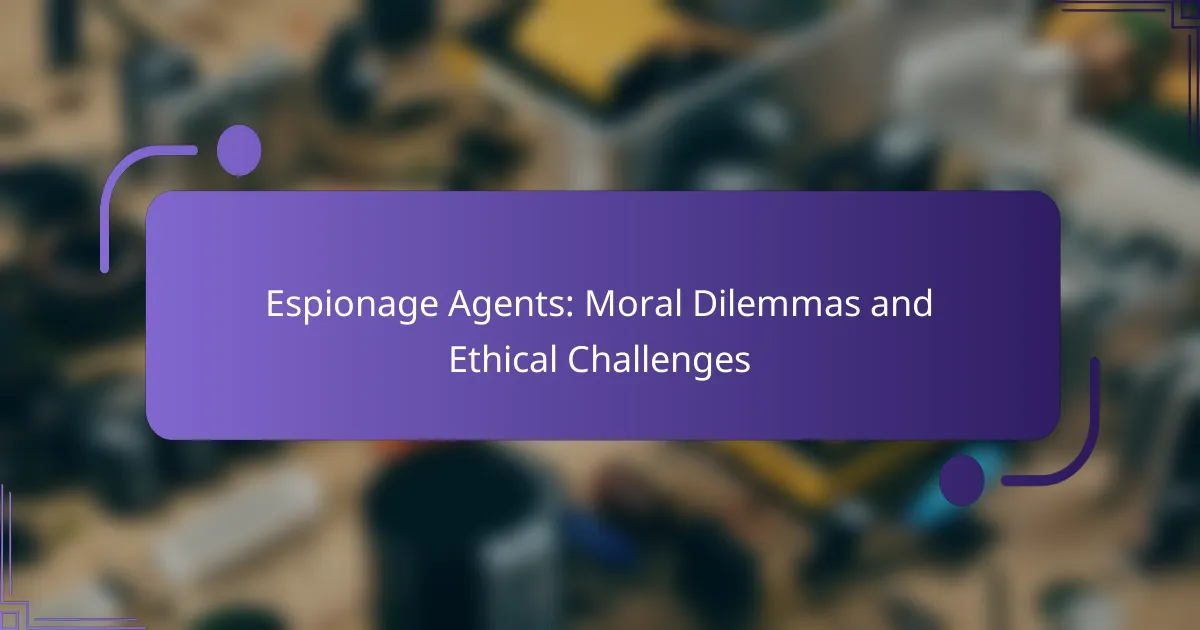Espionage agents face profound moral dilemmas that test their ethical beliefs and personal values, often involving loyalty, the consequences of their actions on innocent lives, and the conflict between legal and ethical responsibilities. To navigate these challenges, agents rely on established codes of conduct, ethical frameworks, and rigorous training, which guide their decision-making in alignment with both mission objectives and moral considerations.
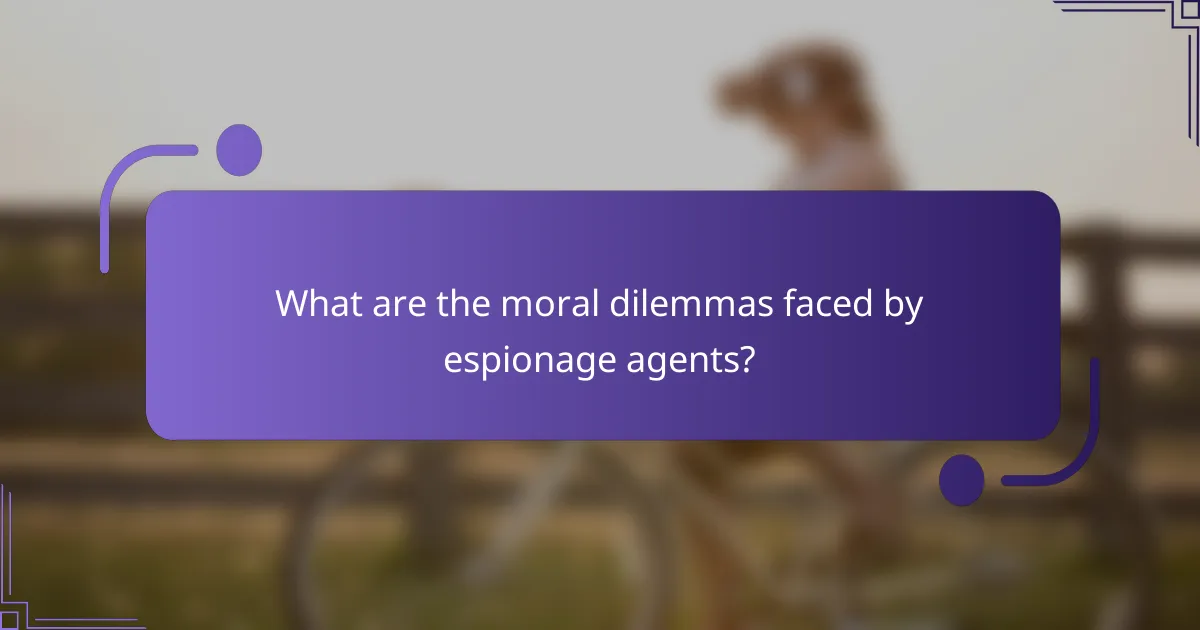
What are the moral dilemmas faced by espionage agents?
Espionage agents encounter significant moral dilemmas that challenge their ethical beliefs and personal values. These dilemmas often revolve around issues of loyalty, the impact of their actions on innocent lives, and the tension between legal and ethical obligations.
Conflicting loyalties
Espionage agents frequently face conflicting loyalties between their country and the individuals they interact with. For instance, an agent may develop personal relationships with foreign nationals while tasked with gathering intelligence against their interests. This duality can create intense emotional strain and ethical conflict.
Agents must navigate these loyalties carefully, weighing their duty to their nation against their moral obligation to protect individuals who may be unwittingly caught in the crossfire of espionage activities.
Impact on innocent lives
The actions of espionage agents can inadvertently harm innocent people, raising ethical questions about collateral damage. For example, surveillance operations may disrupt the lives of civilians who have no connection to the target. Agents must consider the potential consequences of their actions on the broader community.
Understanding the ripple effects of their operations is crucial, as agents must balance national security interests with the moral imperative to minimize harm to non-combatants.
Legal versus ethical obligations
Espionage agents often operate in a gray area where legal frameworks do not align with ethical standards. While certain actions may be sanctioned by law, they can still be morally questionable. For instance, tactics like deception or manipulation may be legally permissible but ethically troubling.
Agents must critically assess their actions against both legal requirements and their personal ethical beliefs, striving to act in a manner that aligns with their moral compass while fulfilling their duties.
Personal sacrifice
Engaging in espionage often requires significant personal sacrifice, including time away from family and friends, and the risk of physical harm or imprisonment. Agents may find themselves isolated, grappling with the emotional toll of their work. This sacrifice can lead to strained relationships and a sense of alienation.
Recognizing the personal costs involved is essential for agents, as it can impact their mental health and overall well-being, necessitating support systems to help them cope with these challenges.
Long-term psychological effects
The psychological impact of working as an espionage agent can be profound and long-lasting. Many agents experience stress, anxiety, or post-traumatic stress disorder (PTSD) due to the nature of their work and the moral dilemmas they face. The constant need for secrecy and deception can exacerbate these issues.
It is crucial for agents to seek mental health support and develop coping strategies to mitigate these psychological effects, ensuring they can maintain their mental health while fulfilling their roles effectively.
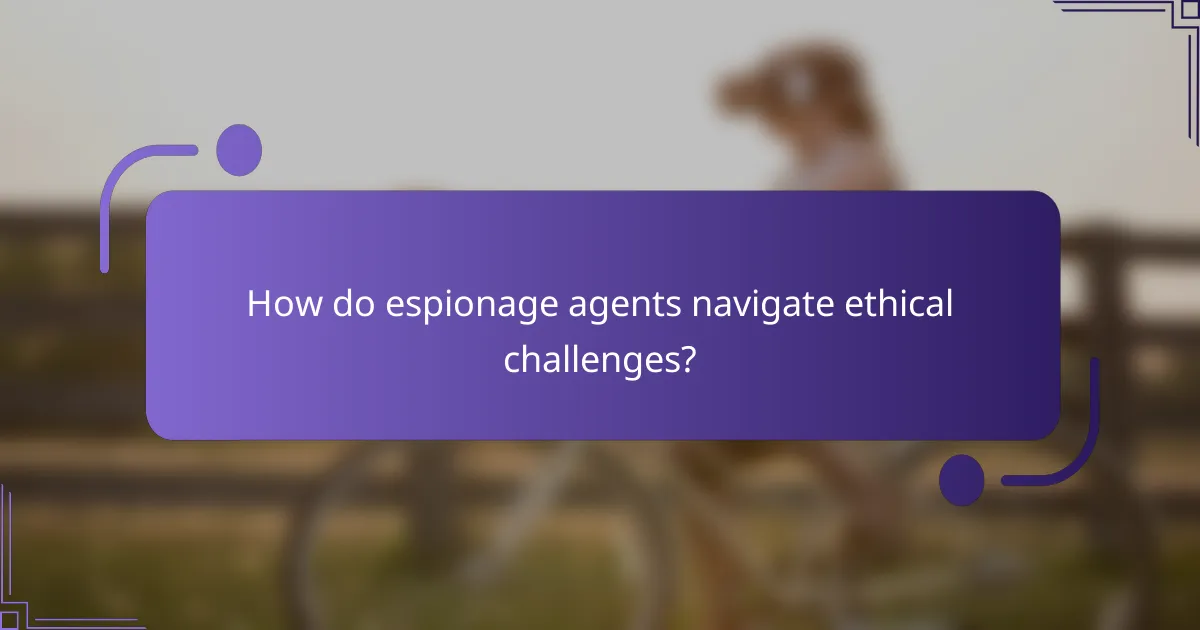
How do espionage agents navigate ethical challenges?
Espionage agents navigate ethical challenges by adhering to established codes of conduct, utilizing ethical frameworks, and undergoing extensive training. These elements help them make decisions that align with both their mission objectives and moral considerations.
Adherence to codes of conduct
Espionage agents are often guided by formal codes of conduct that outline acceptable behaviors and ethical standards. These codes typically emphasize loyalty, integrity, and respect for human rights, providing a framework for decision-making in complex situations.
For example, agents may be required to avoid actions that could harm innocent civilians, even if such actions could yield valuable intelligence. Adhering to these codes helps maintain the legitimacy of their operations and the trust of the public.
Utilization of ethical frameworks
Ethical frameworks, such as utilitarianism or deontological ethics, assist espionage agents in evaluating the consequences of their actions. By weighing the potential benefits against the moral implications, agents can make more informed choices that align with their agency’s values.
For instance, an agent might consider whether the intelligence gained from a covert operation justifies the potential risks to individuals involved. This structured approach allows for a more consistent evaluation of ethical dilemmas.
Training and preparation
Training programs for espionage agents often include modules on ethics and moral decision-making. These programs prepare agents to confront real-world dilemmas by simulating scenarios that challenge their ethical beliefs and decision-making skills.
Agents may engage in role-playing exercises that highlight the consequences of various choices, helping them develop a strong moral compass. Continuous education on ethical standards is crucial, as it reinforces the importance of integrity in their operations.
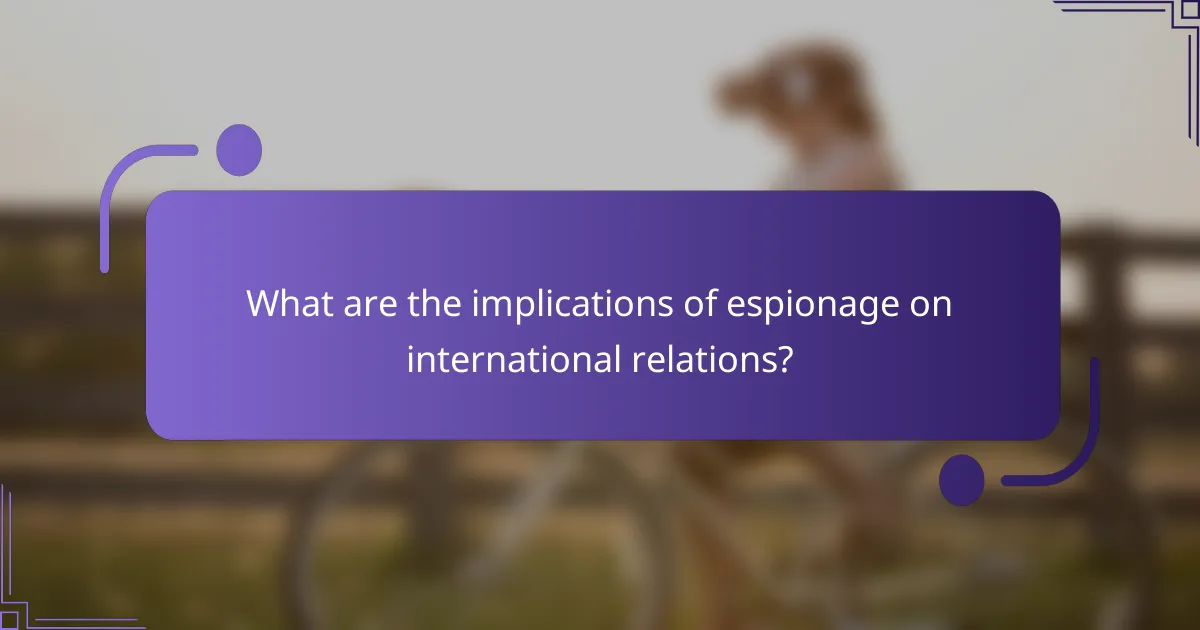
What are the implications of espionage on international relations?
Espionage significantly impacts international relations by fostering distrust and complicating diplomatic engagements. The covert nature of intelligence gathering often leads to misunderstandings and tensions between nations, affecting their ability to collaborate on global issues.
Trust erosion between nations
Espionage activities can lead to a substantial erosion of trust between countries. When one nation discovers that another has been spying on it, it can create a sense of betrayal, undermining previously established relationships. This loss of trust can hinder future cooperation on critical matters such as trade agreements and security alliances.
For example, revelations of espionage can prompt nations to reassess their diplomatic strategies, often resulting in more secretive and defensive postures. This shift can create a cycle of suspicion, where nations feel compelled to engage in their own espionage efforts to protect their interests.
Potential for conflict escalation
The act of espionage can escalate tensions and potentially lead to conflicts between nations. When sensitive information is leaked or misinterpreted, it can provoke aggressive responses, including military posturing or economic sanctions. Such actions may escalate into broader confrontations if not managed carefully.
In some cases, nations may retaliate against perceived espionage through cyberattacks or other covert operations, further increasing the risk of conflict. The delicate balance of power can be disrupted, leading to an environment where misunderstandings can trigger significant geopolitical crises.
Diplomatic repercussions
Espionage can have serious diplomatic repercussions, including the expulsion of diplomats and the severing of ties. When espionage is uncovered, the affected nation may respond by recalling its ambassadors or imposing sanctions, which can strain bilateral relations for years.
Additionally, the fallout from espionage can influence multilateral organizations and alliances. Countries may find themselves isolated or pressured to take sides, complicating efforts to address global challenges such as climate change or terrorism. Maintaining open lines of communication becomes essential to mitigate these repercussions and restore diplomatic relations.
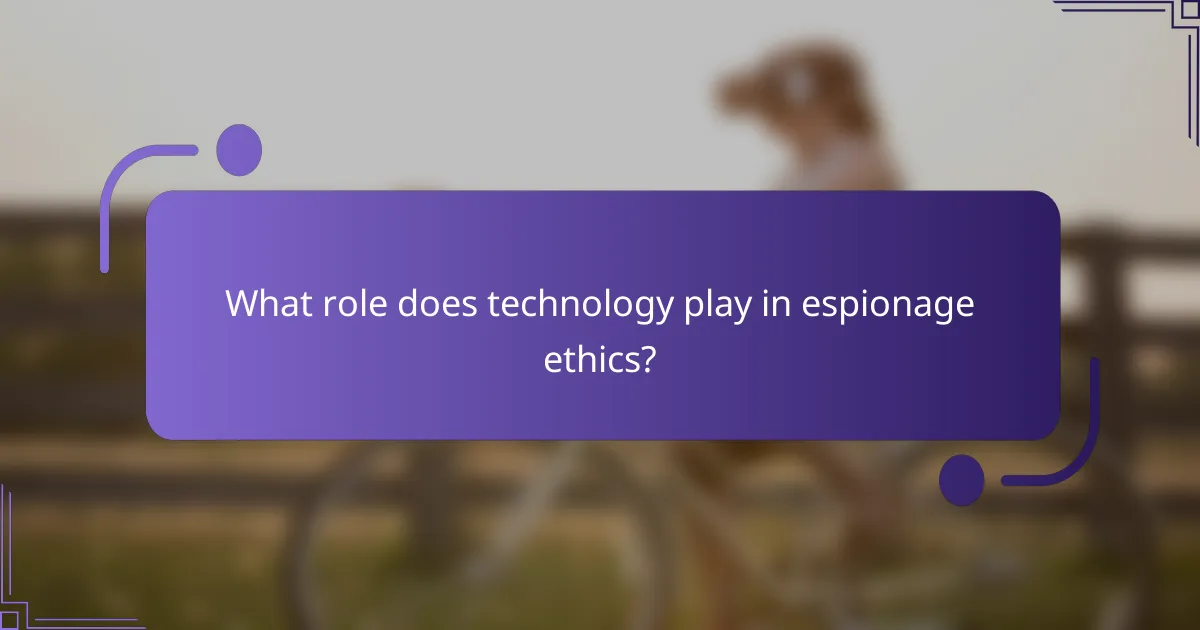
What role does technology play in espionage ethics?
Technology significantly impacts espionage ethics by enhancing surveillance capabilities while raising serious ethical concerns about privacy and consent. The integration of advanced tools necessitates a careful balance between national security interests and individual rights.
Surveillance capabilities
Modern technology has transformed surveillance capabilities, allowing for real-time monitoring and data collection on a large scale. Tools such as drones, satellite imaging, and advanced software enable intelligence agencies to gather information more efficiently than ever before.
However, these capabilities come with ethical dilemmas. The ease of surveillance can lead to overreach, where agencies may infringe on personal privacy without adequate justification. Establishing clear guidelines and oversight is essential to prevent misuse.
Data privacy concerns
Data privacy is a critical concern in the realm of espionage, particularly as technology enables the collection of vast amounts of personal information. Citizens often remain unaware of the extent to which their data is being monitored and analyzed.
Regulations like the General Data Protection Regulation (GDPR) in Europe aim to protect individual privacy rights, but enforcement can be challenging. Intelligence agencies must navigate these laws carefully to balance operational needs with ethical obligations towards citizens’ privacy.
AI in intelligence gathering
Artificial intelligence (AI) plays a pivotal role in intelligence gathering by automating data analysis and identifying patterns that human analysts might miss. AI can process large datasets quickly, providing insights that enhance decision-making in espionage operations.
Despite its advantages, the use of AI raises ethical questions about bias and accountability. Algorithms can inadvertently perpetuate existing biases, leading to unfair targeting or profiling. Agencies must ensure transparency in AI applications and regularly audit their systems to mitigate these risks.
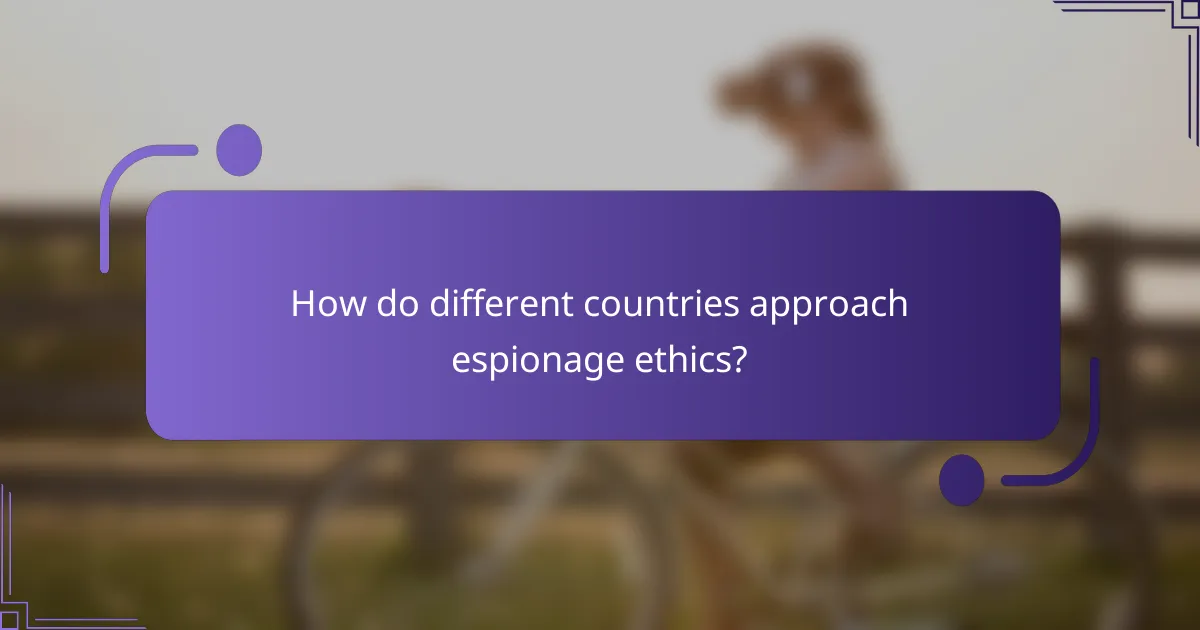
How do different countries approach espionage ethics?
Countries vary significantly in their approaches to espionage ethics, influenced by legal frameworks, cultural norms, and national security interests. While some nations prioritize transparency and accountability, others may embrace aggressive tactics with little regard for ethical considerations.
United States’ legal framework
The United States operates under a complex legal framework that governs espionage activities, primarily through the Espionage Act of 1917 and various intelligence oversight laws. These regulations aim to balance national security needs with civil liberties, requiring agencies to operate within defined legal boundaries.
Ethical dilemmas often arise when intelligence operations conflict with individual rights or international law. For instance, surveillance programs must navigate privacy concerns while addressing threats, creating a challenging environment for ethical decision-making.
Russia’s state-sponsored espionage
Russia’s approach to espionage is characterized by state-sponsored initiatives that often prioritize national interests over ethical considerations. The government actively supports intelligence operations, viewing them as essential to maintaining geopolitical power and influence.
Ethical challenges in Russian espionage include the use of disinformation and cyber tactics that can undermine democratic processes in other nations. This aggressive stance raises questions about the moral implications of such actions on global stability and trust.
China’s cyber-espionage practices
China employs extensive cyber-espionage tactics as part of its national strategy, often targeting foreign corporations and governments to acquire sensitive information. This approach is justified by the state as necessary for economic growth and technological advancement.
Ethical concerns surrounding China’s cyber practices include violations of intellectual property rights and the potential for significant economic disruption. These actions challenge international norms and raise debates about the legitimacy of state-sponsored cyber operations in the global arena.
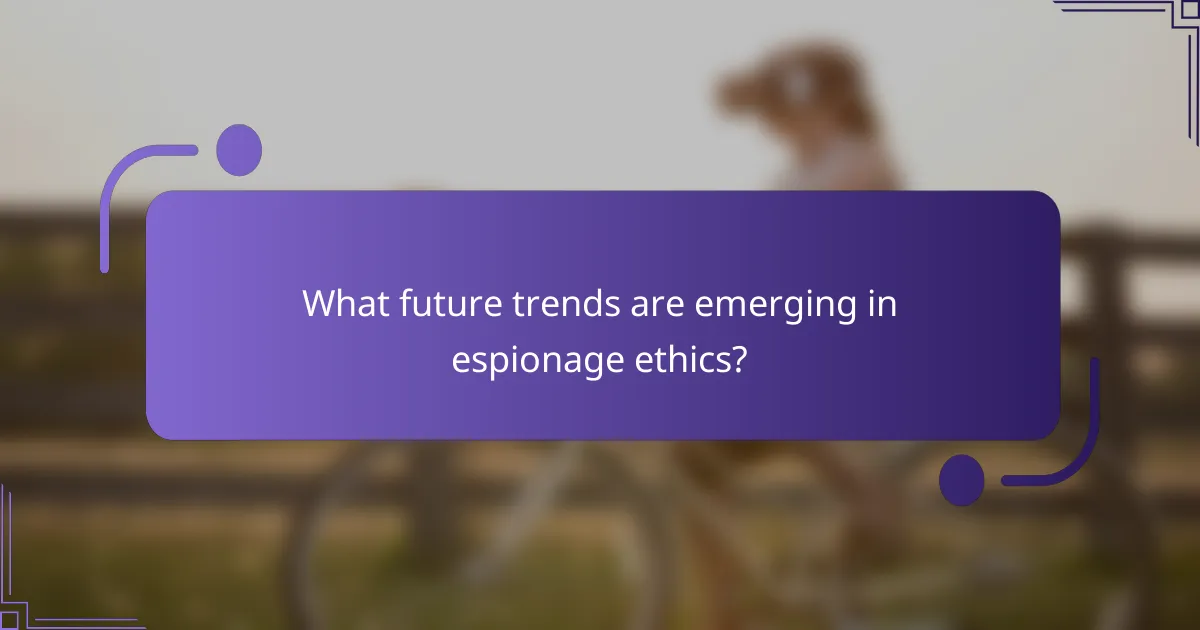
What future trends are emerging in espionage ethics?
Future trends in espionage ethics are increasingly focused on transparency, accountability, and the implications of technology. As surveillance capabilities expand, ethical considerations will evolve to address the balance between national security and individual privacy rights.
Increased Transparency in Operations
There is a growing demand for transparency in espionage operations, driven by public scrutiny and the need for accountability. Agencies may implement clearer guidelines on what constitutes acceptable surveillance and intelligence gathering, ensuring that operations are justifiable and aligned with ethical standards.
For instance, some countries are beginning to publish annual reports detailing their intelligence activities, which helps to foster trust between the government and citizens. This trend may lead to more robust oversight mechanisms and public engagement in discussions about espionage practices.
Ethical Use of Technology
The rapid advancement of technology poses significant ethical challenges for espionage. Tools such as artificial intelligence and big data analytics can enhance intelligence capabilities but also raise concerns about privacy violations and misuse of information.
Agencies will need to establish clear ethical guidelines regarding the use of these technologies. For example, implementing strict protocols on data collection and ensuring that AI systems are used responsibly can help mitigate potential abuses.
Balancing National Security and Human Rights
As nations grapple with security threats, the challenge of balancing national security interests with human rights will become more pronounced. Ethical dilemmas may arise when intelligence operations infringe on civil liberties, prompting debates about the justification of such actions.
Countries may adopt frameworks that prioritize human rights in espionage practices, ensuring that operations are conducted within legal and ethical boundaries. This could involve regular assessments of the impact of intelligence activities on individual rights and freedoms.
